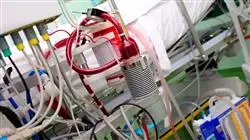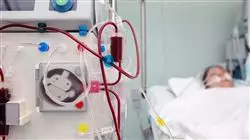University certificate
The world's largest faculty of medicine”
Introduction to the Program
Ensuring that the blood components to be transfused have optimal quality levels becomes the fundamental objective of blood processing and one of your strengths after completing this program"

The physician specialized in hematology is also, in the country, a specialist in hemotherapy, a discipline to which traditionally less time is devoted in academic preparation, both in universities and in subsequent specialization. When talking about hemotherapy, donation is the starting point, and only a solid foundation at this early stage will result in its success. Therefore, this program will cover whole blood donation, from the promotion of donation to the moment when the donor completes the donation, and the donation moves to the
processing phase.
Thus, it is essential to place special emphasis on donor selection criteria, on knowing which situations, whether pathological or not, exclude a candidate for donation, in order to guarantee the safety of the entire transfusion chain, from the donor to the recipient.
After donation, it is necessary to process the donation in order, on the one hand, to achieve maximum utilization of the components and, on the other hand, to guarantee, as far as possible, the safety of the transfusion. Thus, ensuring that the blood components to be transfused have optimal quality levels becomes the fundamental objective of
blood processing.
Likewise, it is essential to be aware of the different possibilities that arise before the clinician who indicates the transfusion. Therefore, the knowledge of the modifications that can be applied to the components, in order to adapt them to the possible receivers, is one of the central points of this Postgraduate diploma.
On the other hand, apheresis procedures are infrequent techniques, but they should be thoroughly known by physicians. This is a moderately invasive procedure performed by the hematology department, sometimes also by the nephrology department, but many specialties can benefit from it. This program goes in depth into the realization, what this therapy consists of and its different modalities, also reviewing its side effects and possible complications.
Thus, the clinical indications of this procedure in hematology will be developed more specifically, apheresis for the collection of hematopoietic progenitors, plasma exchange and altruistic donation of the different blood components that can be performed by apheresis, in addition to assessing the indications in other specialties in which this procedure is gaining relevance, such as renal and neurological pathologies.
You will learn in depth about apheresis procedures and their different modalities, reviewing their side effects and possible complications together with experts in the sector"
This Postgraduate diploma in Blood Components and Therapeutic Apheresis contains the most complete and up-to-date scientific program on the market. The most important features include:
- The development of case studies presented by experts in Transfusion Medicine and Patient Blood Management, specialized in Therapeutic Apheresis
- The graphic, schematic, and practical contents with which they are created, provide scientific and practical information on the disciplines that are essential for professional development
- Practical exercises where self-assessment can be used to improve learning
- With a special emphasis on evidence-based medicine and research methodologies in the field of transfusion medicine
- Theoretical lessons, questions to the expert, debate forums on controversial topics, and individual reflection assignments
- Content that is accessible from any device with an Internet connection
Thanks to this Postgraduate diploma, you can specialize comfortably where, when and how you want simply through a device with internet access"
The program’s teaching staff includes professionals from the sector who contribute their work experience to this program, as well as renowned specialists from leading societies and prestigious universities.
Its multimedia content, developed with the latest educational technology, will provide the professional with situated and contextual learning, i.e., a simulated environment that will provide immersive education programmed to learn in real situations.
This program is designed around Problem-Based Learning, whereby the professional must try to solve the different professional practice situations that arise throughout the program. For this purpose, the professional will be assisted by an innovative interactive video system created by renowned and experienced experts.
You will perfectly understand the process of blood donation and blood components according to the current legislative framework in Spain"

You will learn the alternatives to allogeneic blood transfusion as outlined in the Seville Document, with special interest in self-donation"
Why study at TECH?
TECH is the world’s largest online university. With an impressive catalog of more than 14,000 university programs available in 11 languages, it is positioned as a leader in employability, with a 99% job placement rate. In addition, it relies on an enormous faculty of more than 6,000 professors of the highest international renown.

Study at the world's largest online university and guarantee your professional success. The future starts at TECH”
The world’s best online university according to FORBES
The prestigious Forbes magazine, specialized in business and finance, has highlighted TECH as “the world's best online university” This is what they have recently stated in an article in their digital edition in which they echo the success story of this institution, “thanks to the academic offer it provides, the selection of its teaching staff, and an innovative learning method aimed at educating the professionals of the future”
A revolutionary study method, a cutting-edge faculty and a practical focus: the key to TECH's success.
The most complete study plans on the university scene
TECH offers the most complete study plans on the university scene, with syllabuses that cover fundamental concepts and, at the same time, the main scientific advances in their specific scientific areas. In addition, these programs are continuously being updated to guarantee students the academic vanguard and the most in-demand professional skills. In this way, the university's qualifications provide its graduates with a significant advantage to propel their careers to success.
TECH offers the most comprehensive and intensive study plans on the current university scene.
A world-class teaching staff
TECH's teaching staff is made up of more than 6,000 professors with the highest international recognition. Professors, researchers and top executives of multinational companies, including Isaiah Covington, performance coach of the Boston Celtics; Magda Romanska, principal investigator at Harvard MetaLAB; Ignacio Wistumba, chairman of the department of translational molecular pathology at MD Anderson Cancer Center; and D.W. Pine, creative director of TIME magazine, among others.
Internationally renowned experts, specialized in different branches of Health, Technology, Communication and Business, form part of the TECH faculty.
A unique learning method
TECH is the first university to use Relearning in all its programs. It is the best online learning methodology, accredited with international teaching quality certifications, provided by prestigious educational agencies. In addition, this disruptive educational model is complemented with the “Case Method”, thereby setting up a unique online teaching strategy. Innovative teaching resources are also implemented, including detailed videos, infographics and interactive summaries.
TECH combines Relearning and the Case Method in all its university programs to guarantee excellent theoretical and practical learning, studying whenever and wherever you want.
The world's largest online university
TECH is the world’s largest online university. We are the largest educational institution, with the best and widest online educational catalog, one hundred percent online and covering the vast majority of areas of knowledge. We offer a large selection of our own degrees and accredited online undergraduate and postgraduate degrees. In total, more than 14,000 university degrees, in eleven different languages, make us the largest educational largest in the world.
TECH has the world's most extensive catalog of academic and official programs, available in more than 11 languages.
Google Premier Partner
The American technology giant has awarded TECH the Google Google Premier Partner badge. This award, which is only available to 3% of the world's companies, highlights the efficient, flexible and tailored experience that this university provides to students. The recognition as a Google Premier Partner not only accredits the maximum rigor, performance and investment in TECH's digital infrastructures, but also places this university as one of the world's leading technology companies.
Google has positioned TECH in the top 3% of the world's most important technology companies by awarding it its Google Premier Partner badge.
The official online university of the NBA
TECH is the official online university of the NBA. Thanks to our agreement with the biggest league in basketball, we offer our students exclusive university programs, as well as a wide variety of educational resources focused on the business of the league and other areas of the sports industry. Each program is made up of a uniquely designed syllabus and features exceptional guest hosts: professionals with a distinguished sports background who will offer their expertise on the most relevant topics.
TECH has been selected by the NBA, the world's top basketball league, as its official online university.
The top-rated university by its students
Students have positioned TECH as the world's top-rated university on the main review websites, with a highest rating of 4.9 out of 5, obtained from more than 1,000 reviews. These results consolidate TECH as the benchmark university institution at an international level, reflecting the excellence and positive impact of its educational model.” reflecting the excellence and positive impact of its educational model.”
TECH is the world’s top-rated university by its students.
Leaders in employability
TECH has managed to become the leading university in employability. 99% of its students obtain jobs in the academic field they have studied, within one year of completing any of the university's programs. A similar number achieve immediate career enhancement. All this thanks to a study methodology that bases its effectiveness on the acquisition of practical skills, which are absolutely necessary for professional development.
99% of TECH graduates find a job within a year of completing their studies.
Postgraduate Diploma in Blood Components and Therapeutic Apheresis
Live the TECH experience from the comfort of your home 100% online, and delve into blood components and therapeutic apheresis with this Postgraduate Diploma. The program is designed to provide healthcare professionals with specialized training in the management of blood components and therapeutic apheresis. Blood components are essential elements in clinical practice, as they are used in numerous medical procedures such as blood transfusions, surgeries, oncological treatments, among others. Therefore, it is essential that health professionals have adequate knowledge about the handling of these components and their correct administration. Our program is of vital importance in the healthcare field. We provide professionals with the knowledge and skills necessary for them to correctly manage and administer blood components and therapeutic apheresis.
Get trained in TECH and grow professionally.
The importance of this academic program lies in the need to prepare professionals trained and specialized in the management of blood components and therapeutic apheresis. This ensures that health professionals are prepared to provide quality care to patients who require blood transfusions or treatments through therapeutic apheresis. In addition, the Postgraduate Diploma in Blood Components and Therapeutic Apheresis provides the opportunity to update and expand knowledge in the field of transfusion medicine and apheresis therapy. This allows health professionals to keep up to date with scientific and technological advances related to these fields, thus ensuring state-of-the-art, quality care for their patients. This ensures quality care and efficacy in medical procedures that require these elements. In TECH we have a whole arsenal of learning tools such as multimedia content, virtual library, and complementary readings where participants can continue learning after each online class with teachers. Enroll now and experience the best of online education.







